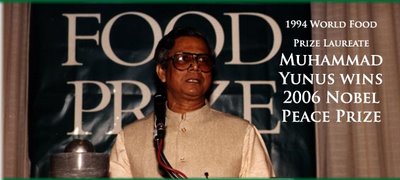Le Monde | Profiling International Cooperation and Peace
LinkHere
 Dr. Muhammad Yunus was chosen to receive the 1994 World Food Prize for his original approach to promoting the economic and social empowerment of the poorest citizens of Bangladesh, specifically women and children. Through his novel program of no-collateral micro-loans, millions of impoverished, undernourished, and disenfranchised families have gained access to adequate food and nutrition for the first times in their lives, giving them the health necessary to obtain education, employment, and long-term security.
Dr. Muhammad Yunus was chosen to receive the 1994 World Food Prize for his original approach to promoting the economic and social empowerment of the poorest citizens of Bangladesh, specifically women and children. Through his novel program of no-collateral micro-loans, millions of impoverished, undernourished, and disenfranchised families have gained access to adequate food and nutrition for the first times in their lives, giving them the health necessary to obtain education, employment, and long-term security.
Dr. Yunus, a native of Bangladesh born in 1940, holds a Ph.D. in economics from Vanderbilt University and taught economics for several years at Chittagong University in Bangladesh. His training and expertise in economics allowed him to understand how hunger and malnutrition are intimately linked to economic factors – the most basic cause of hunger, he has written, is the lack of ability to pay for food. In a country where some 118 million people live on 55,000 square miles and the annual per capita income is only $210, Dr. Yunus and the Grameen Bank that he founded have brought remarkable achievements since 1976 in helping people provide for their families’ basic needs.
The Grameen Bank is a bank owned by the poor that loans its money to the poor. The majority of its loans support traditional subsistence activities: planting a crop, buying a cow, raising chickens, or grinding grain. As a result, people receiving loans not only have better access to food, but in many cases they are able to use the small profits from selling excess food to secure necessities such as clothing and shelter. Loans – on the average less than $100, and rarely more than $300 – are granted without collateral; instead, applicants must form a committee of five friends or neighbors as social insurance on the success of the proposed project. About 96 percent of the bank's loans are made to women, who traditionally oversee food distribution, to ensure that this basic resource receives top priority in households’ and organizations’ management decisions.
Since its modest beginnings, the Grameen Bank has opened more than 1,500 branches in rural areas, where nine out of ten Bangladeshis live, and serves almost half of Bangladesh's 68,000 villages, or more than 2 million people. The bank is 94 percent member-owned; virtually all of its members are landless or own less than an acre of land. It has granted almost $5 billion in loans, the repayment rate for which – almost 99 percent – far exceeds that of commercial banks. In 2005 the bank expects to make over half a billion dollars in loans.
The results of Dr. Yunus' ingenuity have been remarkable. Loan recipients increase their incomes by 50 percent over three years on average. Malnutrition is less prevalent among Grameen Bank members than among Bangladeshis in general: half the children of Grameen Bank members have normal height and weight at age nine; less than one-third of the children of non-members have normal measurements. Acute hunger and starvation prior to the harvest season is far less common among the bank's members. The distribution of food resources within families is much more equitable after women have been empowered to control their own destinies with a Grameen Bank loan.
Under Dr. Yunus’ leadership, Grameen Bank programs have actively improved Bangladesh's food supply and energized its agricultural sector. The bank has given over 6 million packets of vegetable seeds and almost 3 million saplings to encourage home gardening and conservation. It has made over 2 million loans for poultry, livestock, and fish production. The bank's officers are trained to discuss health care and proper nutrition with loan recipients and regularly organize workshops on such matters as livestock and poultry care, proper nutrition, and good sanitation.
The Grameen Fisheries Foundation encourages the development of aquaculture in Bangladesh and the Grameen Agriculture Foundation supplies poor farmers with operating capital, production advices and marketing assistance. Through these foundations, Dr. Yunus has promoted the diversification of crops to include corn, soybeans, and sunflowers in addition to the traditional crops of rice, wheat, and sugarcane. In the wake of natural disasters, the bank distributes food, seeds, saplings and money to people in the affected areas.
The international impact of Dr. Yunus’ program has been resounding. Several loan programs in underdeveloped areas have been operating on the Grameen model with similar successes from Malaysia to South America, as well as in poor rural and urban areas in the United States. Dr. Yunus has been sought to serve on and consult for several international groups on development practices, including the World Bank’s Advisory Council for Sustainable Economic Development and UNESCO’s International Advisory Panel, and on a range of policy commissions in Bangladesh dealing with education, health, population policy, and land reform. In addition to the World Food Prize, he has won over 50 prestigious international awards and 22 honorary degrees from universities on all continents. He created the Yunus Foundation in 1996 and continues to lead the Grameen Bank into the new millennium.
The overwhelming success of Dr. Yunus’ career and his dedication to helping the poor and hungry participate in solving the problems of poverty and hunger has won him global respect in developing and developed areas alike. His genius has nourished and empowered millions in Bangladesh and inspired others to replicate his efforts in other countries, and he continues to work devotedly toward building a world where all families are able to adequately feed and support healthy and educated children.




0 Comments:
Post a Comment
<< Home